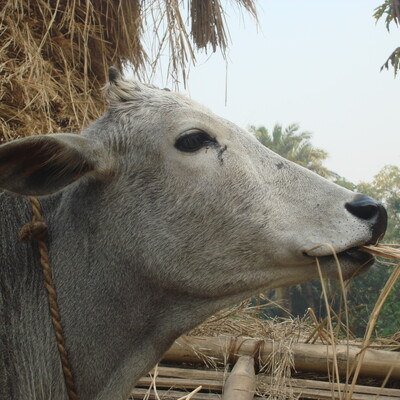
Unite human, animal and environmental health to prevent the next pandemic, says ILRI/UN report
 ● COVID-19 is just one example of the rising trend of diseases—from Ebola to MERS to West Nile and Rift Valley fevers—caused by viruses that have jumped from animal hosts into the human population.
● COVID-19 is just one example of the rising trend of diseases—from Ebola to MERS to West Nile and Rift Valley fevers—caused by viruses that have jumped from animal hosts into the human population.
● A new assessment offers 10 recommendations and identifies One Health as the optimal way to prevent and respond to future pandemics.
● The rising trend in zoonotic diseases is driven by the degradation of our natural environment—through land degradation, wildlife exploitation, resource extraction, climate change and other stresses.
As the COVID-19 pandemic continues to take lives and disrupt economies across the world, a new report warns that further outbreaks will emerge unless governments take active measures to prevent other zoonotic diseases from crossing into the human population, and sets out 10 recommendations to prevent future pandemics.
The report, ‘Preventing the next pandemic: zoonotic diseases and how to break the chain of transmission,’ is a joint effort by the United Nations Environment Programme (UNEP) and the International Livestock Research Institute (ILRI).
It identifies seven trends driving the increasing emergence of zoonotic diseases including increased demand for animal protein, a rise in intense and unsustainable farming, the increased use and exploitation of wildlife and the climate crisis. The report finds that Africa, which has experienced and responded to a number of zoonotic epidemics, including most recently to Ebola outbreaks, could be an important source of solutions to quell future outbreaks.
‘The science is clear that if we keep exploiting wildlife and destroying our ecosystems, then we can expect to see a steady stream of these diseases jumping from animals to humans in the years ahead,’ said UNEP executive director Inger Andersen. ‘Pandemics are devastating to our lives and our economies, and as we have seen over the past months, it is the poorest and the most vulnerable who suffer the most. To prevent future outbreaks, we must become much more deliberate about protecting our natural environment’.
A ‘zoonotic disease’ or ‘zoonosis’ is a disease that has passed into the human population from an animal source. COVID-19, which has already caused more than half a million deaths around the world, most likely originated in bats. But COVID-19 is only the latest in a growing number of diseases—including Ebola, MERS, West Nile fever and Rift Valley fever—whose spread from animal hosts into human populations has been intensified by anthropogenic pressures.
Every year, some two million people, mostly in low- and middle-income countries, die from neglected zoonotic diseases. The same outbreaks can cause severe illness, deaths and productivity losses among livestock populations in the developing world, a major problem that keeps hundreds of millions of small-scale farmers in severe poverty. In the last two decades alone, zoonotic diseases have caused economic losses of more than USD100 billion, not including the cost of the COVID-19 pandemic, which is expected to reach USD9 trillion over the next few years.
African countries have an opportunity to lead pandemic prevention efforts
Zoonotic diseases are on the rise everywhere on the planet, and African countries—a number of which have successfully managed deadly zoonotic outbreaks—have the potential to leverage this experience to tackle future outbreaks through approaches that incorporate human, animal and environmental health. The continent is home to a large portion of the world’s remaining intact rainforests and other wild lands. Africa is also home to the world’s fastest-growing human population, leading to an increase in encounters between livestock and wildlife and, in turn, the risk of zoonotic diseases.
‘The situation on the continent today is ripe for intensifying existing zoonotic diseases and facilitating the emergence and spread of new ones’, said ILRI director general Jimmy Smith. ‘But with their experiences with Ebola and other emerging diseases, African countries are demonstrating proactive ways to manage disease outbreaks. They are applying, for example, novel risk-based rather than rule-based approaches to disease control, which are best suited to resource-poor settings, and they are joining up human, animal and environment expertise in proactive One Health initiatives’.
The report’s authors identify the One Health approach—which unites public health, veterinary and environmental expertise—as the optimal method for preventing as well as responding to zoonotic disease outbreaks and pandemics.
Ten recommendations
The report identifies 10 practical steps that governments can take to prevent future zoonotic outbreaks:
- investing in interdisciplinary approaches, including One Health;
- expanding scientific enquiry into zoonotic diseases;
- improving cost-benefit analyses of interventions to include full-cost accounting of societal impacts of disease;
- raising awareness of zoonotic diseases;
- strengthening monitoring and regulation practices associated with zoonotic diseases, including food systems.
- incentivizing sustainable land management practices and developing alternatives for food security and livelihoods that do not rely on the destruction of habitats and biodiversity;
- improving biosecurity and control, identifying key drivers of emerging diseases in animal husbandry and encouraging proven management and zoonotic disease control measures;
- supporting the sustainable management of landscapes and seascapes that enhance sustainable coexistence of agriculture and wildlife;
- strengthening capacities among health stakeholders in all countries; and
- operationalizing the One Health approach in land-use and sustainable development planning, implementation and monitoring, among other fields.
The report launch comes on World Zoonoses Day, observed by research institutions and non-governmental entities on 6 July, which commemorates the work of French biologist Louis Pasteur. On 6 July 1885, Pasteur successfully administered the first vaccine against rabies, a zoonotic disease.
Learn more about ILRI’s new One Health Research, Education and Outreach Centre for Africa here. Learn more about ILRI’s work on zoonotic diseases here. For further information about the report, see here; key messages are summarized here in several languages.
















